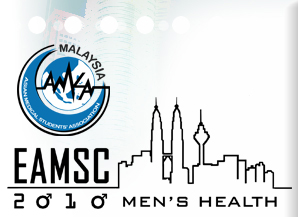While women and child health issues have been receiving much attention throughout the past few decades, men’s health development has just only begun. However, collaborations that advocate interest beyond men’s traditional clinical concern such as erectile dysfunction remain fairly lacking. Among the few initiatives undertaken by medical professionals are the Third Japan-ASEAN Men’s Health Conference 2008 in Singapore and national policies formation regarding men’s health by certain countries such as Australia.

It is a well-proven fact with Tom Perls, founder of the New England Centenarian Study at Boston University stating that across the industrialized world, women still live 5 to 10 years longer than men and that among people over 100 years old, 85% are women.
In Malaysia, the sex ratio for those aged 65 and above is only 0.78 (male: female). While it could be attributed to biological factors, it cannot be denied that external factors such as lifestyle and environment can influence men’s health. Unlike women and children, men do not pay much attention to health. This is evidenced by a survey from the Royal Pharmaceutical Society of Great Britain (RPSGB) discovered that almost a third of men under 40 do nothing about bad health in the hope that illness will "go away".
In line with that, AMSA Malaysia decided to choose Men’s Health as the theme of the 23rd East Asian Medical Students’ Conference 2010. We would like to take advantage of the various participating countries in this conference and explore the reasons why men’s health receive lesser share of medical attention and ways to set new trends in the region by bringing the matter to light. The 23rd EAMSC would also like to address issues that play the role in
 determining men’s health and at the same time, promote men’s health.
determining men’s health and at the same time, promote men’s health.We hope to initiate a good momentum of men’s health awareness in participating countries well before the conference through research papers conducted by medical students which the results will be presented during the conference. Studies will be conducted to understand different countries’ health policies and indicators regarding men’s health. Focused discussion will then be held to stimulate ways to improve men’s health during the conference.
Besides, we would like to recognize the strength of medical students from the region in shaping the future of medicine. Thus, community outreach programmes are created to empower these aspiring doctors into acknowledging their social responsibility and believing that they help create a sustainable change in the community they are living.
Through this conference, we are taking the opportunity that aspiring doctors from Asia Pacific region are uniting in Malaysia to change the scene of men’s health not only in Malaysia but beyond, for the future. This is in hope of sending a message to the public advocating for a more prosperous collaboration for the betterment of men’s health.




